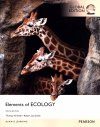Textbook
By: Thomas M Smith(Author), Robert Leo Smith(Author)
704 pages, colour photos, colour illustrations, colour tables
![Elements of Ecology (International Edition) Elements of Ecology (International Edition)]()
Click to have a closer look
About this book
Contents
Customer reviews
Biography
Related titles
About this book
Elements of Ecology, Ninth Edition continues to explain ecological processes clearly and concisely, with a greater emphasis on the relevance of ecology to everyday life and the human impact on ecosystems. This dramatically revised edition discusses issues of human ecology throughout the text and provides a greater variety of opportunities for students to learn, practice, and develop quantitative and analytical skills. Current research examples and other content updates are supported by more than 200 redesigned, full-colour illustrations, graphs, and tables.
Contents
Chapter 1: The Nature of Ecology
Chapter 2: Climate
Chapter 3: The Aquatic Environment
Chapter 4: The Terrestrial Environment
Chapter 5: Adaptation and Natural Selection
Chapter 6: Plant Adaptations to the Environment
Chapter 7: Animal Adaptations to the Environment
Chapter 8: Properties of Populations
Chapter 9: Population Growth
Chapter 10: Life History
Chapter 11: Intraspecific Population Regulation
Chapter 12: Species Interactions, Population Dynamics, and Natural Selection
Chapter 13: Interspecific Competition
Chapter 14: Predation
Chapter 15: Parasitism and Mutualism
Chapter 16: Community Structure
Chapter 17: Factors Influencing the Structure of Communities
Chapter 18: Community Dynamics
Chapter 19: Landscape Dynamics
Chapter 20: Ecosystem Energetics
Chapter 21: Decomposition and Nutrient Cycling
Chapter 22: Biogeochemical Cycles
Chapter 23: Terrestrial Ecosystems
Chapter 24: Aquatic Ecosystems
Chapter 25: Coastal and Wetland Ecosystems
Chapter 26: Large-Scale Patterns of Biological Diversity
Chapter 27: Global Climate Change
Customer Reviews
Biography
Thomas M. Smith, Associate Professor in Environmental Sciences at the University of Virginia, received his Ph.D. in ecology from the University of Tennessee in 1982. The main focus of his research over the past two decades has been to develop an individual based theory of community and ecosystems dynamics. As part of this work he has served on numerous national and international panels that have addressed the potential influence of human activities on the global environment. He has authored over 70 publications based on his research, and he has been recognized as one of the most cited scientists in the field of global change research. Thomas's work has taken him to over 70 countries and 6 continents. He has served on the faculty of the University of Witwatersrand (Johannesburg, South Africa), Australian National University (Canberra, Australia), as well as the University of Virginia (Charlottesville, VA, USA). In addition, he has held research scientist positions at both Oak Ridge National Laboratory (Oak Ridge, TN, USA) and the Institute for Applied Systems Analysis (Laxenburg, Austria). His has over 20 years of experience teaching the science of ecology to both science and non-science majors.
Robert L. Smith holds a Ph.D. in Wildlife Biology from Cornell University. He is Professor Emeritus of Ecology at West Virginia University. He has spent over 30 years teaching Ecology and conducting field research throughout the world. His teaching responsibilities have involved mostly undergraduate courses in general ecology and graduate courses in population ecology and wildlife management. His research has included forest-fire related problems in southern West Virginia, vegetational development and succession on abandoned and reclaimed surface mines, the relation between forest vegetational structure and the forest bird community, and forest habitat assessment and habitat evaluation procedures based on vegetational structure. Smith has served as a consultant to congressional committees, workshops on environmental education and energy and environmental problems, the National Landmarks program of the U.S. Department of Interior, National Research Council Task Forces on wildlife and fisheries issues and ecological classification systems for implementing environmental quality evaluation procedures.
Textbook
By: Thomas M Smith(Author), Robert Leo Smith(Author)
704 pages, colour photos, colour illustrations, colour tables























